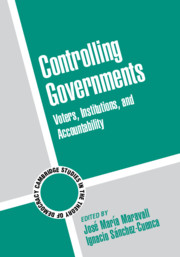Book contents
- Frontmatter
- Contents
- Acknowledgments
- Contributors
- Controlling Governments
- Introduction
- 1 Explaining the Electoral Performance of Incumbents in Democracies
- 2 How Can Governments Be Accountable If Voters Vote Ideologically?
- 3 Enduring Ethnicity: The Political Survival of Incumbent Ethnic Parties in Western Democracies
- 4 Performance or Representation? The Determinants of Voting in Complex Political Contexts
- 5 Political Knowledge and the Logic of Voting: A Comparative Study
- 6 The Political Consequences of Internal Party Democracy
- 7 Choosing Rules for Government: The Institutional Preferences of Early Socialist Parties
- 8 Constitutions and Democratic Breakdowns
- Author Index
- Subject Index
- References
4 - Performance or Representation? The Determinants of Voting in Complex Political Contexts
Published online by Cambridge University Press: 28 October 2009
- Frontmatter
- Contents
- Acknowledgments
- Contributors
- Controlling Governments
- Introduction
- 1 Explaining the Electoral Performance of Incumbents in Democracies
- 2 How Can Governments Be Accountable If Voters Vote Ideologically?
- 3 Enduring Ethnicity: The Political Survival of Incumbent Ethnic Parties in Western Democracies
- 4 Performance or Representation? The Determinants of Voting in Complex Political Contexts
- 5 Political Knowledge and the Logic of Voting: A Comparative Study
- 6 The Political Consequences of Internal Party Democracy
- 7 Choosing Rules for Government: The Institutional Preferences of Early Socialist Parties
- 8 Constitutions and Democratic Breakdowns
- Author Index
- Subject Index
- References
Summary
Introduction
It may seem somewhat obvious to state that citizens, when voting, take government performance into consideration. However, it is one of the most fundamental ingredients of democracy that citizens may use their vote to reward good governments and punish bad ones (Przeworski, Stokes, and Manin 1999). This notion that voting is linked to government performance has been argued extensively (e.g., Fiorina 1981; Key 1966).
Nevertheless, in practice it is clear that there are numerous obstacles to the vote being a mechanism by which rewards and punishments are issued. To begin with, the vote is far from being a perfect evaluation tool because of what is often called “policy bundling” (Besley and Coate 2000) in which voters are forced to include in one single decision their evaluations of many widely different aspects of government performance. Moreover, it may be the case that these same evaluations are biased by voters' political and ideological preferences (Maravall and Przeworski 2001) or simply that voters find it difficult to gauge the extent to which the government is responsible for policy results (Powell and Whitten 1993; Barreiro 1999; Anderson 2000; Powell 2000; Rudolph 2003).
The aim of this chapter is to determine how voters respond to government performance when two simultaneous circumstances that obstruct the simple application of the vote as a reward and punishment tool are at play. On one hand, the voters are faced with a government that is vertically divided (there are both a central government and regional governments).
- Type
- Chapter
- Information
- Controlling GovernmentsVoters, Institutions, and Accountability, pp. 105 - 130Publisher: Cambridge University PressPrint publication year: 2007
References
- 3
- Cited by

